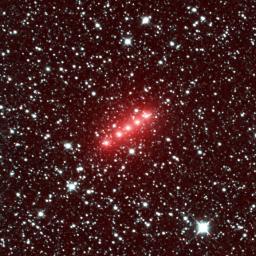
|
NASA’s NEOWISE Images Comet C/2014 Q2 (Lovejoy)
- Click the image above for a larger view
- Full-Res JPEG (1799 x 1799) (559.9 kB)
- Full-Res TIFF (1799 x 1799) (9.7 MB)
Caption:
Comet C/2014 Q2 (Lovejoy) is one of more than 32 comets imaged by NASA's NEOWISE mission from December 2013 to December 2014. This image of comet Lovejoy combines a series of observations made in November 2013, when comet Lovejoy was 1.7 astronomical units from the sun. (An astronomical unit is the distance between Earth and the sun.)
The image spans half of one degree. It shows the comet moving in a mostly west and slightly south direction. (North is 26 degrees to the right of up in the image, and west is 26 degrees downward from directly right.) The red color is caused by the strong signal in the NEOWISE 4.6-micron wavelength detector, owing to a combination of gas and dust in the comet's coma.
Comet Lovejoy is the brightest comet in Earth's sky in early 2015. A chart of its location in the sky during dates in January 2015 is at https://photojournal.jpl.nasa.gov/catalog/PIA19103 .
Background Info:
For more information about NEOWISE (the Near-Earth Object Wide-field Survey Explorer), see http://neowise.ipac.caltech.edu .
NASA's Jet Propulsion Laboratory manages the NEOWISE mission for NASA's Science Mission Directorate in Washington. The Space Dynamics Laboratory in Logan, Utah, built the science instrument. Ball Aerospace & Technologies Corp. of Boulder, Colo., built the spacecraft. Science operations and data processing take place at the Infrared Processing and Analysis Center at the California Institute of Technology in Pasadena. Caltech manages JPL for NASA.
Cataloging Keywords:
| Name | Value | Additional Values |
|---|---|---|
| Target | C/2014 Q2 (Lovejoy) | |
| System | ||
| Target Type | Comet | |
| Mission | Near-Earth Object Wide-field Infrared Survey Explorer (NEOWISE) | |
| Instrument Host | NEOWISE | |
| Host Type | Space Telescope | |
| Instrument | NEOWISE Telescope | |
| Detector | ||
| Extra Keywords | Color, Dust, Infrared | |
| Acquisition Date | ||
| Release Date | 2015-01-13 | |
| Date in Caption | ||
| Image Credit | NASA/JPL-Caltech | |
| Source | photojournal.jpl.nasa.gov/catalog/PIA19102 | |
| Identifier | PIA19102 | |
